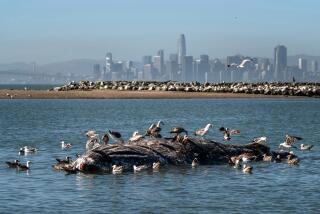South Africans Battle Over Whales’ Turf
- Share via
HERMANUS, South Africa — They recently celebrated the annual Moby Dick Whale Festival in this postcard-perfect fishing town near the southern tip of Africa.
Whale aficionados say there isn’t a better place to watch the giant mammals, which migrate here every winter and spring from Antarctica to mate and to rear their young. What makes Hermanus so special, they say, is that there’s no need to get into a boat. The southern right whales swim within clear view of the dramatic cliffs of Walker Bay, a 12-mile-wide playground for the cetaceans. From the comfort of a park bench, visitors can witness the stuff of a National Geographic documentary.
But this year, for the first time, whale watching from boats is officially on offer. The whales don’t seem to mind the addition, but there are a lot of bothered people. And as with so many things in this young, multiracial democracy, allegations of racism and economic privilege are central to the debate.
“Knowing this place, there is going to be a lot of arguing to come,” said Jan van der Velden, vice chairman of the Greater Hermanus Assn. for Commerce and Tourism.
Opponents of the new whale-watching boats worry about being overrun by modern-day Captain Ahabs. In Herman Melville’s 19th century novel, Ahab takes to the sea to seek revenge against Moby Dick. Ahab is killed, his ship sinks, and Moby Dick endures three days of torment after having been harpooned.
Already police have issued $250 fines to whale-watching “pirates,” illegal boat operators who offer close-up tours without a permit. They have also chased away people riding personal watercraft, some of which have ridden over whales. But police say they are too short-handed to keep up with the violators.
Conservationists have submitted a proposal to the South African government to declare Walker Bay a whale sanctuary. Although the details have yet to be worked out, the intent is to ban boats between July and November, the peak whale-breeding season.
“The whales choose this area--they are not herded, pushed or frightened into coming here,” said Brian Ancketill of the Walker Bay Conservation Forum. “We want that wonder to be maintained in perpetuity.”
But Phillipus May of the Hawston Fishing Co. views the sanctuary movement with suspicion. His company represents 48 abalone fishermen, all black, in the nearby township of Hawston, a poor stepsister to predominantly white Hermanus. The fishermen have been granted one of two government permits to run tours in the bay.
The fishermen have invested nearly $50,000 in a passenger boat and equipment. For the past two months, they have been charging about $40 a person for two hours of whale watching. With the bay’s abalone population severely depleted, the tours are helping to keep food on the table for many families, May said.
“Some whites in Hermanus still don’t want to give us a chance to make some money for a decent life,” said May, whose great-grandfather was a harpooner. “We just got our permit, and now they want to stop the boats. This wouldn’t be happening if we were a different color.”
Rudy Hughes, who is white, also holds a permit for boat-based whale watching. He suggests that the sanctuary drive has more to do with money than race or protecting whales.
Some businesspeople don’t want to see tourists spending their money outside the town, he said, and many retirees in Hermanus--a popular retirement destination for well-to-do whites--oppose any change that might ruin their exclusive paradise by bringing traffic and crowds. Authorities should crack down on the unlicensed boat owners, Hughes said, and leave the two legitimate operators alone.
“Boats do not harass whales if done correctly,” he said. “I have video of whales playing with me on my boat. It all depends on the skipper’s experience.”
Valli Moosa, minister of environmental affairs and tourism, says he likes the sanctuary idea because it could transform Walker Bay into a major international tourist attraction. He also suggests that the bay is probably big enough to accommodate Hughes and May, perhaps in the waters far from shore, but not the flotilla of other seagoers.
“There may be disadvantages for some people if we declare a world-class sanctuary, but we think the advantages tourism will bring to this area far outweigh the disadvantages,” he said.
More to Read
Sign up for Essential California
The most important California stories and recommendations in your inbox every morning.
You may occasionally receive promotional content from the Los Angeles Times.










